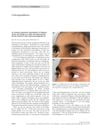 18 citations,
July 2022 in “Frontiers in Immunology”
18 citations,
July 2022 in “Frontiers in Immunology” Volatile organic compounds can cause inflammation and increase the risk of autoimmune diseases.
 10 citations,
June 2020 in “Journal of Cosmetic Dermatology”
10 citations,
June 2020 in “Journal of Cosmetic Dermatology” Frontal fibrosing alopecia may be linked to genital Lichen sclerosus through an autoimmune process.
 2 citations,
August 2022 in “Emergency medicine international”
2 citations,
August 2022 in “Emergency medicine international” Keloid skin disorder involves abnormal fibroblast activation and immune response, linked to a group of genes including FGF11.
 2 citations,
December 2023 in “Journal of clinical immunology”
2 citations,
December 2023 in “Journal of clinical immunology” Ruxolitinib significantly improves multiple autoimmune conditions in APS-1 patients.
 1 citations,
January 2023 in “International Journal of Molecular Sciences”
1 citations,
January 2023 in “International Journal of Molecular Sciences” Understanding how Regulatory T Cells work could help create treatments for certain skin diseases and cancers.
 1 citations,
September 2022 in “BioNanoScience”
1 citations,
September 2022 in “BioNanoScience” Tofacitinib can help hair grow back in alopecia patients but hair loss might return if the dose is lowered.
 July 2022 in “medRxiv (Cold Spring Harbor Laboratory)”
July 2022 in “medRxiv (Cold Spring Harbor Laboratory)” Satoyoshi syndrome is likely an autoimmune disease that mainly affects young women and improves with immune-related treatments.
January 2024 in “Biomedicines” The review shows that skin symptoms like chronic fungal infections, hair loss, and skin depigmentation are key for early detection and management of APECED.
 April 2015 in “Journal of Evolution of Medical and Dental Sciences”
April 2015 in “Journal of Evolution of Medical and Dental Sciences” People with autoimmune skin diseases often have hearing problems and should get their hearing checked early.
 January 2000 in “BioScience”
January 2000 in “BioScience” The document concludes that understanding hair biology is key to treating hair disorders, with gene therapy showing potential as a future treatment.
 31 citations,
June 2011 in “Journal of the neurological sciences”
31 citations,
June 2011 in “Journal of the neurological sciences” Removing the thymoma improved the man's autoimmune conditions.
 20 citations,
April 2021 in “Journal of Womens Health”
20 citations,
April 2021 in “Journal of Womens Health” Testosterone can help premenopausal and postmenopausal women with low sexual desire, but its long-term safety is unclear and it's not widely approved for this use.
 2 citations,
August 2021 in “Journal of Clinical Psychopharmacology”
2 citations,
August 2021 in “Journal of Clinical Psychopharmacology” An 8-year-old girl's eyebrow hair loss was linked to atomoxetine for ADHD but grew back after stopping the medication.
 February 2024 in “Curēus”
February 2024 in “Curēus” A balanced diet with proteins, vitamins, and minerals is crucial for managing skin disorders.
 May 2017 in “InTech eBooks”
May 2017 in “InTech eBooks” Some hair loss disorders cause permanent loss due to scarring, and treatments like steroids don't always work well.
 September 2022 in “Dermato”
September 2022 in “Dermato” Adult acne is often related to hormonal disorders, especially in women, and may need long-term treatment involving specialists.

A young woman with kidney failure had hair loss due to a common hormonal disorder, which improved with hormone therapy.
227 citations,
April 2020 in “Cell” More precise, personalized therapies are needed for autoimmune diseases.
 1 citations,
November 2022 in “Journal of Dermatological Treatment”
1 citations,
November 2022 in “Journal of Dermatological Treatment” Platelet-rich plasma can increase hair density and may help treat some skin conditions, but it's costly, not FDA-approved, and needs more research.
 February 2024 in “Journal of Paediatrics and Child Health”
February 2024 in “Journal of Paediatrics and Child Health” Hormonal changes and social stress may link lupus and eating disorders in teens.
 December 2022 in “Biological and Clinical Sciences Research Journal”
December 2022 in “Biological and Clinical Sciences Research Journal” Early treatment of mixed connective tissue disease is crucial to prevent severe autoimmune conditions.
 November 2019 in “Harper's Textbook of Pediatric Dermatology”
November 2019 in “Harper's Textbook of Pediatric Dermatology” The document is a detailed medical reference on skin and genetic disorders.
 2 citations,
March 2020 in “International Journal of Molecular Sciences”
2 citations,
March 2020 in “International Journal of Molecular Sciences” Topical treatments can deliver active molecules to skin stem cells, potentially helping treat skin and hair disorders, including skin cancers and hair loss.
 January 2000 in “Expert Opinion on Therapeutic Patents”
January 2000 in “Expert Opinion on Therapeutic Patents” The document highlights various patents for new compounds with potential treatments for multiple diseases, including cancer, hormonal disorders, and diabetes.
 42 citations,
January 1998 in “BioDrugs”
42 citations,
January 1998 in “BioDrugs” Azathioprine's effectiveness and safety require careful monitoring and more research, especially regarding its use with corticosteroids and the role of TPMT status in patients.
 1 citations,
January 2000 in “Springer eBooks”
1 citations,
January 2000 in “Springer eBooks” Pregnancy can cause various skin changes and diseases, requiring careful treatment to protect the baby.
 14 citations,
November 2009 in “Clinical and experimental dermatology”
14 citations,
November 2009 in “Clinical and experimental dermatology” Topical prostaglandin E2 can help treat both alopecia areata and vitiligo.
 151 citations,
February 2007 in “International Journal of Dermatology”
151 citations,
February 2007 in “International Journal of Dermatology” Alopecia areata causes hair loss, has no cure, and various treatments exist.
 44 citations,
August 2010 in “Lupus”
44 citations,
August 2010 in “Lupus” Lupus can affect the scalp and nails, often causing hair loss and nail damage, and needs early aggressive treatment to prevent permanent damage.
 23 citations,
July 2021 in “Advances in Therapy”
23 citations,
July 2021 in “Advances in Therapy” Most people with Alopecia Areata don't get treatment within a year; it's costly and often comes with other health issues.




























